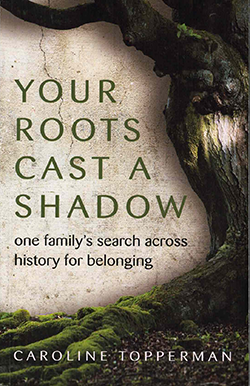Your Roots Cast a Shadow by Caroline Topperman; Boca Raton, Florida: Health Communications, Inc.; © 2024; ISBN 9780757-325427; 309 pages; $17.95.

 SAN DIEGO – This memoir about a search for details about her parents’ and grandparents’ lives in Europe and travels outside the continent reads like a series of blog posts. Some chapters are entertaining, some introspective, some gossipy, and some reflective. Author Topperman grew up in Canada, to which her parents had immigrated, after trying out Sweden. She is the product of a mixed Polish family; her mother’s side is Jewish; her father’s side is Catholic.
SAN DIEGO – This memoir about a search for details about her parents’ and grandparents’ lives in Europe and travels outside the continent reads like a series of blog posts. Some chapters are entertaining, some introspective, some gossipy, and some reflective. Author Topperman grew up in Canada, to which her parents had immigrated, after trying out Sweden. She is the product of a mixed Polish family; her mother’s side is Jewish; her father’s side is Catholic.
She married a Polish Catholic man with whom she relocated to Poland for a period of four years.
She offered some impressions about the Jewish experience in Poland, as for example, when she noticed in Warsaw a plaque marking the spot where the boundary wall of the Warsaw Ghetto once stood. “I don’t say anything, but I want to yell out at everyone mindlessly stepping over the metal plaque, ‘Do you know what you just walked over? Do you know what happened here? How can you go about your day and ignore history? At least take a second to acknowledge it.’”
A few pages further into the memoir and Topperman states, “This whole religion thing confuses me, and the older I get, the less I want to have anything to do with it. I simply cannot understand why anyone would want to believe in a higher power.” She recalled making a clay menorah in kindergarten, and still feels a part of the Jewish people, but wondered, “Can I be Jewish without believing in religion?”
On August 1, Warsaw marks the anniversary of the Ghetto Uprising. A palm tree installation at the intersection of Jerusalem Avenue and New World Street is accompanied by a sign stating “Greetings from Jerusalem,” which Topperman describes as a “tribute to Warsaw’s deep connection to its lost Jewish community.”
“All of a sudden someone calls out, and a bunch of kids dressed in period costumes run out into the street carrying flares,” her narrative continued. “Within seconds the air is dense with smoke, and then all the stopped cars start one long uninterrupted honk. One minute later, conversations resume, and everyone moves along like nothing has happened. We are still standing, completely in shock.”
On a tour of Auschwitz, in a group of 10, a man who peppered a guide with questions during the viewing of piles of human hair, eyeglasses and children’s toys, came to the gas chambers where the guide asked that no photos be taken “out of respect” for those who died. Topperman wrote, “As we walked in, I saw the questioning man’s companion pull out her camera. Before she could open it, the man grabbed her arm, harshly shook his head, and took it from her. I could see that he got it. He understood the magnitude of what had happened. This was his life-changing moment.”
These fleeting paragraphs help identify Topperman as sensitive and observant. Most of the book, however, deals with the adventures of the people closest to her on her family tree. It is an interesting European travelogue, with comparisons and contrasts to life in Canada.
*
Donald H. Harrison is publisher and editor of San Diego Jewish World.